Old Stuff: A Monday Missions entry for @qurator
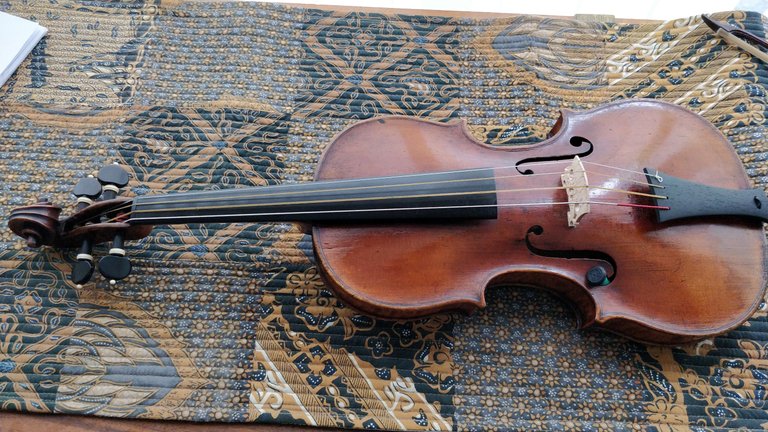
As a Violinist, I have a number of old instruments and bows in my collection of "tools". Some of these are fairly modern, completely newly made violins/violas/dámore or reconstructions based on a historical template or model. However, I have been also lucky enough to score some pretty decent old original instruments as well.
Now, as a musician, you are always in competition with "investors" who have orders of magnitude more money to splash around on their hobby collections. However, often these investors are looking at resale value and will tend to follow the investment trends. This leaves a potential opening for those of us who are looking for tools of our trade! We value playing quality and sound over name and resale value... so, there is a little bit of space where the two interests DON'T overlap!
This particular violin is a case in point, an old English violin made in London by Richard Duke around 1770. At the time, I was looking also at a Dutch violin of similar vintage, but that violin was more of an "investment" grade. The seller of the two violins kept trying to convince me that the Dutch one would be a better long term investment, but I just didn't like the feel of playing it... and so, I kept gravitating back to the Duke. He even told me that I could just buy the Dutch violin and then "flip" it for several times more in 5-10 years time... all well and good, but it would have to be a playing partner for that long... and it wouldn't be worth anything if I got frustrated at it and threw it out the window!
So, eventually... I settled on the Duke... but trust me, I was for a little moment, tempted by the investment angle. However, I will look into that when I have disposable cash for that sort of "hobby".
I have written a bit about this instrument in the past... however, this time I am taking a different angle due to the topic of the post. As a musician, I don't really appreciate the age of the violin... I know it is old (around 250 years...), but to me it feels and plays like a spring chicken (well... it also plays like a violin...) and it doesn't show it's age when we are playing together. So, it is pretty hard for me to grasp exactly HOW OLD it really is!
So, this post is a bit of historical context to the instrument... partly for my own education, as my historical knowledge is a bit thin, but also to boggle my own mind and remind myself how much of an honour it is to have this instrument for a small portion of it's existence.
Contemporary Western History
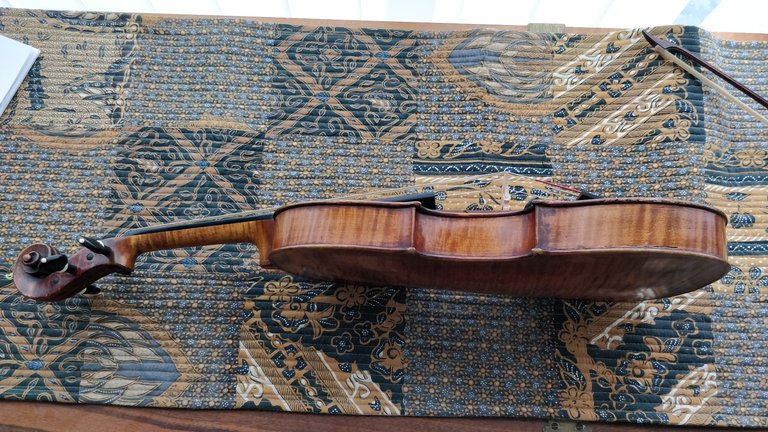
The 1770s was a time of many interesting developments in Europe and the Western world, and it is a bit of a mind explosion to realise that my violin was in the thick of it during this time. Things that are pretty abstract to me... and that exist only in historical textbooks or reverently described in academic writings... well, these things were contemporary to the building of my violin!
So, just before the creation of the violin... the Seven Years war ended (1756-1783), this was the war that pitted the major European powers against each other, and ended up establishing the United Kingdom as the dominant world power of the day. So, in many ways... London (the birthplace of the violin) would be the centre of the world for the violin's creation.
Soon after the violin was made, a colony on the other side of the Atlantic produced a document declaring it's independence. The American Declaration of Independence was first printed in 1776, and so my violin is a rough contemporary of this famed document! In fact, the American Revolution begins in 1775....
The French Revolution, also a huge event in Western European history started in 1789... almost TWO decades after the building of this violin!... and so, it predates the era of Napoleon! 1771 saw the arrival of Marie Antoinette to the French court... and she would be the last Queen of France.
My birthplace (Australia) had no yet been formally colonised by the British (that happened in 1788), although quite a number of landings and crashes had already been made by the Dutch and French. However, in 1770, the first voyage of Captain James Cook and Joseph Banks to the mysterious "Terra Nullius" of the South (Australia and New Zealand) departed Britain. It is followed with several other naval and scientific expeditions to the Southern hemisphere including botanical and eclipse observations.
Contemporary Western Music
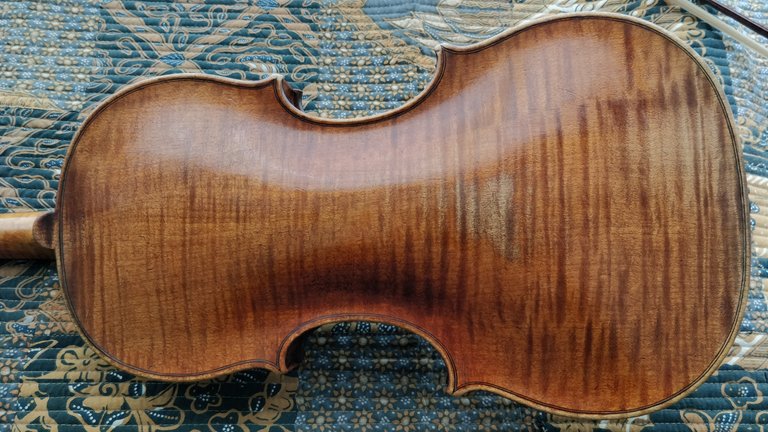
Well... it is only appropriate that I include a music section, after all, that is the purpose of this instrument!
The late 18th century was a time of transition from the High Baroque represented by Bach to the proto-Classicism of Haydn and Mozart. The 1770s sees the death of composers such as Tartini, Avison and Muffat... all of whom were principal proponents of the Baroque style in their various countries and in some cases (Muffat) were making an attempt to melt the disparate French, Italian and German styles into a single style.
Interestingly enough, this era would see the births of composers that would be later associated with the early Romantic movement in music, names such as Schubert and Beethoven. However, the early period of this violin's life would coincide with the Classical style as personified by CPE Bach, Haydn and Mozart.
Contemporary Science
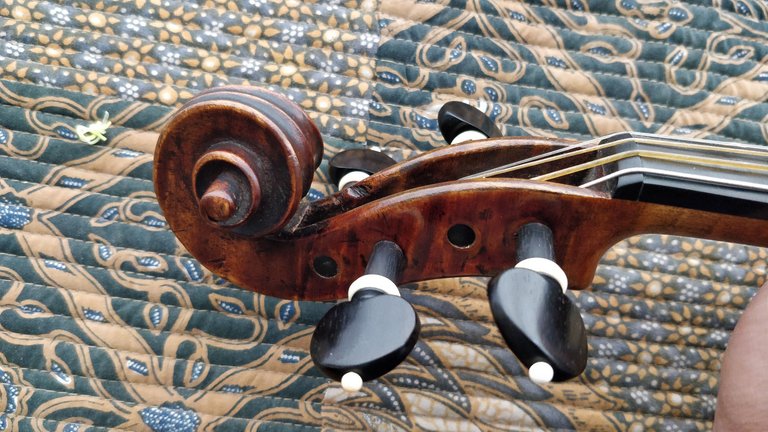
By the 1770s, Science (Natural Philosophy) was seen as a professional calling with societies and academies being formed... and the ideals of the Age of Reason and Enlightenment were now firmly entrenched. That said, it was still a fledgling pursuit, and the scientific method was not yet firmly established... which did lead to some very questionable political/social stereotypes adopting the "scientific" mantle to further their cherry-picked agendas on race, class and poverty.
Chemistry and Biology were starting to find their feet as disciplines of Science with textbooks starting to receive publication. This would start to divorce them from the old ideas of alchemy and mysticism that reveled in the obscuration of knowledge over public dissemination. Nitrogen (and oxygen) was isolated (and the composition of air was theorised upon), which would later prove to a vital building block to the making of fertiliser... speaking of which, urea was discovered as well!
In Mathematics, Bernoulli and Lagrange was at the height of their prowess with publications on gravitation (Lagrange points) and Fluid Dynamics. Euler was also a familiar name with contributions to practically every field of mathematics. The concept of imaginary numbers was starting to be formalised with the notation of (i).
Physics saw the estimation of the density of the Earth and the discovery of galaxies in far off space, Herschel was one of the defining characters of the Astronomy movement with his discovery of the planet Uranus. There was also the first mention of something known as a "dark star", which was the predecessor to what would be later known as a black hole in Einstein's General Relativity.
In technology, the steam engine was only just patented in 1769... and the concept of flushing toilets was being worked upon and improved!
Wrapping Up
For some reason, I just can't get it into my head that my Violin was around for all these avents when it was first made, and that these are the contemporary Western happenings of the time! It just boggles my mind that a piece of wood that I handle every single day of the year (well, most of the days of the year) actually was around for these events AND all the intervening events from that period through to the present day!
It is really quite a humbling thought to think of all the world events that this instrument has witnessed and the number of hands that it has passed through on its way to it's current owner. It does make you feel like a custodian of a long history and put the thought of preserving it in the best condition possible for future generations!


Account banner by jimramones
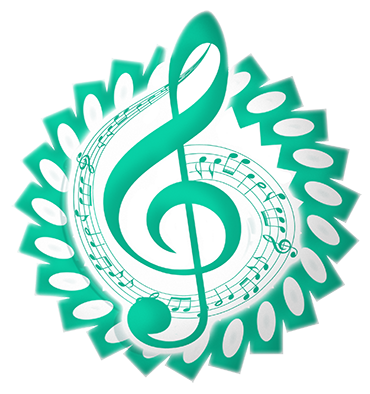

#posh https://twitter.com/CryptoBengy/status/1281226794385973249?s=20
What a great post! This has been so interesting to read! Your violin has indeed been through so much. Oh my... It is indeed humbling.
For how long have you been playing the violin? Who is your favourite composer?
I'm still a bit mind-boggled... it is one thing to know it, but it just seems so unconnected to me when I'm playing it!
I've been playing for a bit short of 4 decades... and as far as a favourite composer... sigh... that is just too hard to choose! I specialise in Baroque and Classical Music, so the music of the Baroque period speaks best to me. The concepts of harmonic tension and resolution were well perfected at that time, and the linking of the music with the spoken rhetoric and the affects.
The Romantic and pre-Baroque are a language that just doesn't resonate with the same strength (for me!).
Wow you have so much experience. Congratulations, you must have so much patience!
!ENGAGE 20
Your post has been supported and upvoted from the Classical Music community (Subscribe at peakd and Steempeak) as it appears to be of interest to our community. We also support jazz and folk music posts!
If you enjoy our support of the #classical-music community, please consider a small upvote to help grow the support account!
You can find details about us below.
The classical music community at #classical-music, Peakd, Steempeak and Discord. Follow our community accounts @classical-music and @classical-radio or follow our curation trail (classical-radio) at SteemAuto!
Wait.... this violin is from 1770?
Boy it looks amazing!
Yes... I can't really ever seem to get my head around that fact... it really feels like things like that should belong in a museum... on the other hand, a violin that can't be played is a bit of a strange thing, as that is what it was designed to do!